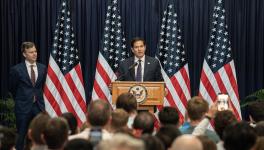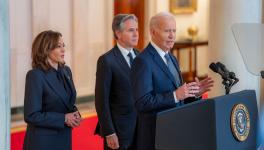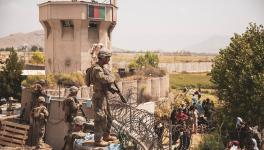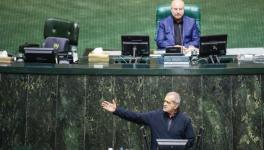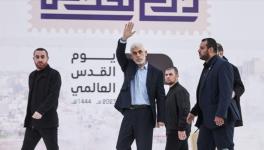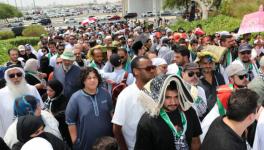As UAE Embraces Iran, Fizz Goes Pop For Abraham Accords
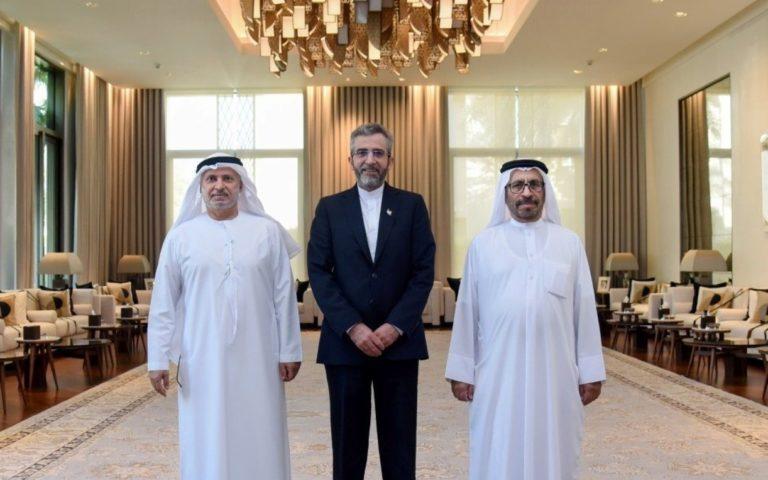
Iran’s Dy Foreign Minister Ali Bagheri Kani (C) with diplomatic adviser to UAE President Anwar Gargash (L) and Minister of State for Foreign Affairs Khalifa Almara, Abu Dhabi, Nov. 16, 2021
The terrible secret about Faustian deals is that they need a Mephistopheles to nurture them. That said, Goethe’s Mephisto is very different from the crude devil of medieval legend. Goethe sketches him as a cultivated, witty, and cynical exponent of materialism and nihilism who preaches a sophisticated doctrine of philosophical negation.
There is no way the Abraham Accords would have survived the Donald Trump presidency except if President Joe Biden had shown the wisdom to retain Jared Kushner as his “senior advisor”. The spirit of the Abraham Accords cannot survive neglect. It withers away. A gifted alchemist like Kushner would know how to keep it in perpetual motion.
Clearly, Saudi Arabia has no interest to rescue the Abraham Accords. And the UAE is speeding up normalisation with Turkey’s Recep Erdogan, Israel’s bête noire. The Emirati Crown Prince Sheikh Mohammed bin Zayed bin Sultan Al Nahyan — colloquially known as MBZ — has gifted to Erdogan an investment package of $10 billion to salvage Turkey’s economy. read more
Importantly, he didn’t make it conditional on Erdogan snapping his links with Hamas — or, abandoning his condemnation of Israeli violence against hapless Palestinians. MBZ’s focus was to normalise the UAE-Turkey relations ahead of Saudi Arabia.
Suffice to say, the UAE regional policies have nothing to do with the propagation of the Abraham Accords. Thus, the UAE has reopened its embassy in Kabul and is negotiating with the Taliban the rights to operate the international airport in the Afghan capital (possibly with Turkish security personnel to assist.)
The new thinking in the UAE policies is taking another leap forward in the normalisation process under way with Iran. The UAE news agency disclosed on Tuesday that a high-level delegation of Emirati officials is proceeding to Tehran soon as part of efforts to improve ties with Iran. This was attributed to Anwar Gargash, Diplomatic Adviser to the UAE President, who put it nicely saying, “I hope that it is sooner the better and all our friends are aware of it. There is a recognition by the Iranians that they need to rebuild bridges with the Gulf. We are picking that up positively.”
Ironically, only the previous day, Monday, in an incredibly foolish move, Prime Minister Naftali Bennett had reluctantly issued a video message urging his Western allies to refuse to reach an agreement with Iran!
Bennett’s act was ridiculous and devoid of any diplomatic logic. It will be an exaggeration to say that the UAE is administering a royal snub to Israel. Probably, it is much worse, as the UAE may be distancing itself from the Abraham Accords whose leitmotif was a counter-strategy against Iran’s surge as regional power.
In reality, the forthcoming UAE-Iran normalisation would have an intrinsic logic. Gargash spoke up even as the negotiations resumed in Vienna between the world powers and Iran. The first reports highlighted that Ali Bagheri Kani, Iran’s deputy foreign minister and head of the negotiating team, had made two groundbreaking proposals on the lifting of sanctions and nuclear activities respectively, while a third proposal specifically on the verification period of the lifting of sanctions is in the pipeline.
Tehran has seized the initiative at the negotiations in Vienna and caught the Europeans and Americans on the wrong foot. How this pans out remains to be seen but, unsurprisingly, the UAE, after reading the tea leaves, decided that going beyond the final outcome of the negotiations in Vienna on the nuclear issue, a new regional security paradigm is shaping up in West Asia.
Earlier, on November 16, Ali Bagheri had met with Gargash in Abu Dhabi. After the talks, Gargash had told the media that the UAE was “taking steps to de-escalate tensions with Iran as part of a policy choice towards diplomacy and away from confrontation.”
Kani himself went on record that Iran and the UAE have agreed to usher in a “new chapter” in their relations. Emirati state news agency WAM said Kani’s meetings in Abu Dhabi “emphasised the importance of strengthening relations on the basis of good neighbourliness and mutual respect.”
Three days before Bagheri’s visit, the foreign ministers of Iran and the UAE also had a phone conversation where they had welcomed the improvement of relations. Iran’s Foreign Minister Hossein Amir-Abdollahian said that Tehran attaches special importance to its ties with the UAE, particularly in trade.
Iran and the UAE have a curious relationship. Despite adversarial posturing, a vexed maritime dispute and mutual suspicions regarding each other’s intentions, Dubai has served Iran as a window to international markets and one-stop shop. Many Iranian merchants maintain offices in Dubai where they have residence and business permits. Iranians can own real estate in Dubai and satellite televisions advertise properties in Iranians can buy with little or no legal restrictions.
Immediately after Gargash’s remarks on Tuesday, the influential Iranian website Nour News, which is regarded as close to the Iranian Supreme Council of National Security, commented that the visit of the high-level delegation from UAE “can be valuable and important as a positive step by the UAE to reduce barriers to cooperation.” It anticipated that the delegation is due “in the coming days with full authority to review and rebuild relations between the two countries and try to change the current situation.”
The Nour News estimated that the UAE “which has spent the past few years trying to position itself as a major player in the region at great financial and security cost, is now trying to stay in the cycle of possible economic and political interests, following the possible agreement (at Vienna), and become pioneer in this path.”
It commended the “the strategic intelligence of the UAE rulers” and was optimistic that the delegation’s visit to Tehran “could be the first step towards establishing a new and comprehensive relationship.” read more
There is speculation that the UAE delegation might be headed by the Crown Prince’s brother and top national security adviser Sheikh Tahnoon bin Zayed Al Nahyan (who is also the chairman and state advisor for the Abu Dhabi Developmental Holding Company, which handles the Sovereign Wealth Fund.)
Needless to say, the UAE is positioning itself on the frontline as the sanctions against Iran get removed and the fabulous wealth of that country in mineral and human resources are unshackled for the country’s economic reconstruction after decades of isolation.
The really amazing part is how easy it would have been for staunch adversaries like the UAE and Iran to embrace each other but for the Western interference in the intra-Gulf affairs. Kushner might not have been aware that the UAE and Iran have deep historical ties up until Imperial Britain intervened to severe them and occupy the Emirati islands. 2021 marks the one hundredth “anniversary” of Britain’s dastardly colonial act.
Get the latest reports & analysis with people's perspective on Protests, movements & deep analytical videos, discussions of the current affairs in your Telegram app. Subscribe to NewsClick's Telegram channel & get Real-Time updates on stories, as they get published on our website.










